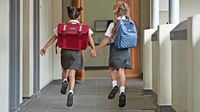As September rolls around and the school gates swing open once more, families across the UK and beyond brace themselves for a season of transition. For many children, this means stepping into a brand-new secondary school, returning after a long summer, or—perhaps most daunting of all—leaving the comfort of home for the very first time. The emotional rollercoaster is real: excitement, nerves, and, for some, a profound sense of anxiety. But in 2025, a wealth of new resources and innovative programs are offering fresh hope and practical solutions for students and parents alike.
On August 29, 2025, BBC Bitesize unveiled its Guide to School Life, an interactive tool designed to help children navigate the tricky waters of starting or returning to secondary school. According to BBC Bitesize, the guide is packed with tips, videos, and advice covering 20 areas where pupils most often need support—everything from tackling homework and dealing with peer pressure, to managing the emotional ups and downs of school life. Importantly, the guide draws on both the lived experiences of current pupils and the expertise of trusted professionals, including television doctors Dr Amir Khan and Dr Radha Modgil, teacher Chloe Vethamony, and neuroscientist Dr Carolina Kuepper-Tetzel. The aim? To ensure that every student has access to the tools and reassurance needed to handle the challenges of those first few months back in the classroom.
But the Guide to School Life isn’t just a static resource. It’s interactive, available around the clock, and features peer-led video content that resonates with students. As BBC Bitesize notes, pupils from years 7 and 8, as well as sixth formers, share their own stories about making friends, dealing with loneliness, and managing anxiety. These testimonies, illustrated with vibrant graphics and beautiful artwork, offer relatable advice that’s both practical and heartfelt. For younger students facing the daunting leap to secondary school, seeing their peers talk openly about their own challenges can be a lifeline.
Meanwhile, a different kind of innovation is unfolding in classrooms and nurseries in London and Manchester. On August 30, 2025, BBC News reported on a unique mentoring program run by the charity Power2, which pairs teenagers with three-year-olds from local nurseries. The goal? To help anxious teens increase their school attendance and engagement by giving them the responsibility of mentoring a younger child. The program, which runs for 16 weeks, sees teenagers visit a nursery once a week to build a bond with their toddler partner. The results have been striking: 78% of participants improve their attitude to learning, and 83% report higher self-esteem, according to Power2’s own research.
Siena, a 13-year-old participant, shared her experience with BBC’s Morning Live: "I had a lot of anxiety so would never be in school, but coming here has taught me more about how to communicate and be more confident and it's funny a toddler is teaching us things." Siena’s attendance more than doubled after joining the program—a testament to the power of responsibility and connection. Miller, 12, another participant, said, "I was a bit nervous and it took me two weeks to say yes to the project as I was really shy." Now, he feels calmer and more focused, and has developed a close bond with his three-year-old mentee.
Sam Marcus, director of services at Power2, explained to BBC News that the pairings are thoughtfully matched to bring out the best in both teens and toddlers: "It's often based on personalities so a really vibrant toddler might be paired with a shy teenager or a timid toddler is matched with a boisterous teen which helps create a much softer side to them." Reflective sessions after each nursery visit help teenagers process their experiences, build healthy relationships, and develop positive attitudes. The benefits are mutual—toddlers, many of whom have additional needs like speech delays or social difficulties, thrive with the extra attention and care.
Yet, the context for these initiatives is sobering. Since the pandemic, persistent school absence has nearly doubled. In the 2024/25 academic year, 17.79% of pupils were classified as persistently absent, missing 10% or more of school sessions. The stakes are high: just 10 days of absence can halve a student’s chance of securing at least a grade 5 in English and Maths, according to data cited by BBC News. For parents, the worry is palpable. How can they help their children overcome anxiety and re-engage with learning?
Experts offer a range of practical strategies. Dr Weisberg, a consultant clinical psychologist, told BBC News that giving children agency and responsibility can make a world of difference. "There are lots of rules at school and none of them are under the kid's control," he explained. "This programme gives them a responsibility and empowerment to learn from what works and what doesn't and they feel like they are making a real difference." His advice to parents includes raising concerns with the school, spending distraction-free time with each child daily, and following the child’s lead in play and conversation.
Sue Armstrong, a clinical service manager at relationship support charity Relate, recommends avoiding blame and guilt, maintaining positive family routines, and accepting that there will be ups and downs. "You may feel you're being pulled in every direction, having to keep a job going and support your child when they may be feeling very anxious and confused, that there's no space left for you," she told BBC News. Her message is clear: patience, empathy, and self-care are vital for families navigating school anxiety.
Of course, anxiety about school isn’t limited to older children. For preschoolers, separation anxiety is often the first big hurdle. In an article published around August 30, 2025, Nicole Blume explored this universal challenge, drawing on insights from the Children’s Hospital of Orange County. Separation anxiety is a normal developmental phase, marked by crying, clinginess, and even physical complaints like stomachaches. While it typically resolves by age three, persistent or severe symptoms may signal a need for professional support.
Blume recommends several strategies for easing the transition: listen to children’s feelings, prepare them mentally and emotionally for school, tour classrooms in advance, and establish consistent routines. Practicing separations—starting with brief absences and gradually increasing the time apart—can help children adjust. Goodbye routines, such as a special hug or a kiss on the palm (as suggested in the beloved book The Kissing Hand), provide comfort and predictability. And while it’s tempting to linger at the school gate, experts advise parents to keep goodbyes brief and calm, reinforcing a sense of safety and confidence in the new environment.
For families looking for further support, resources like Wherever You’ll Be by Ariella Prince Guttman and Llama Llama Misses Mama by Anna Dewdney offer gentle reassurance, while mindfulness techniques and deep breathing can help children develop coping skills for moments of anxiety.
As the new school year unfolds, it’s clear that the journey from home to classroom is rarely straightforward. Yet, with the right mix of expert advice, peer support, and innovative programs, children and parents alike can find their footing—and maybe even discover a little joy along the way.





